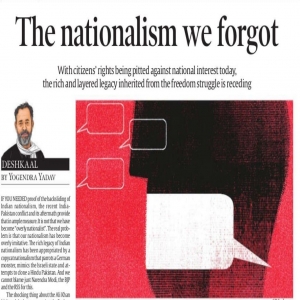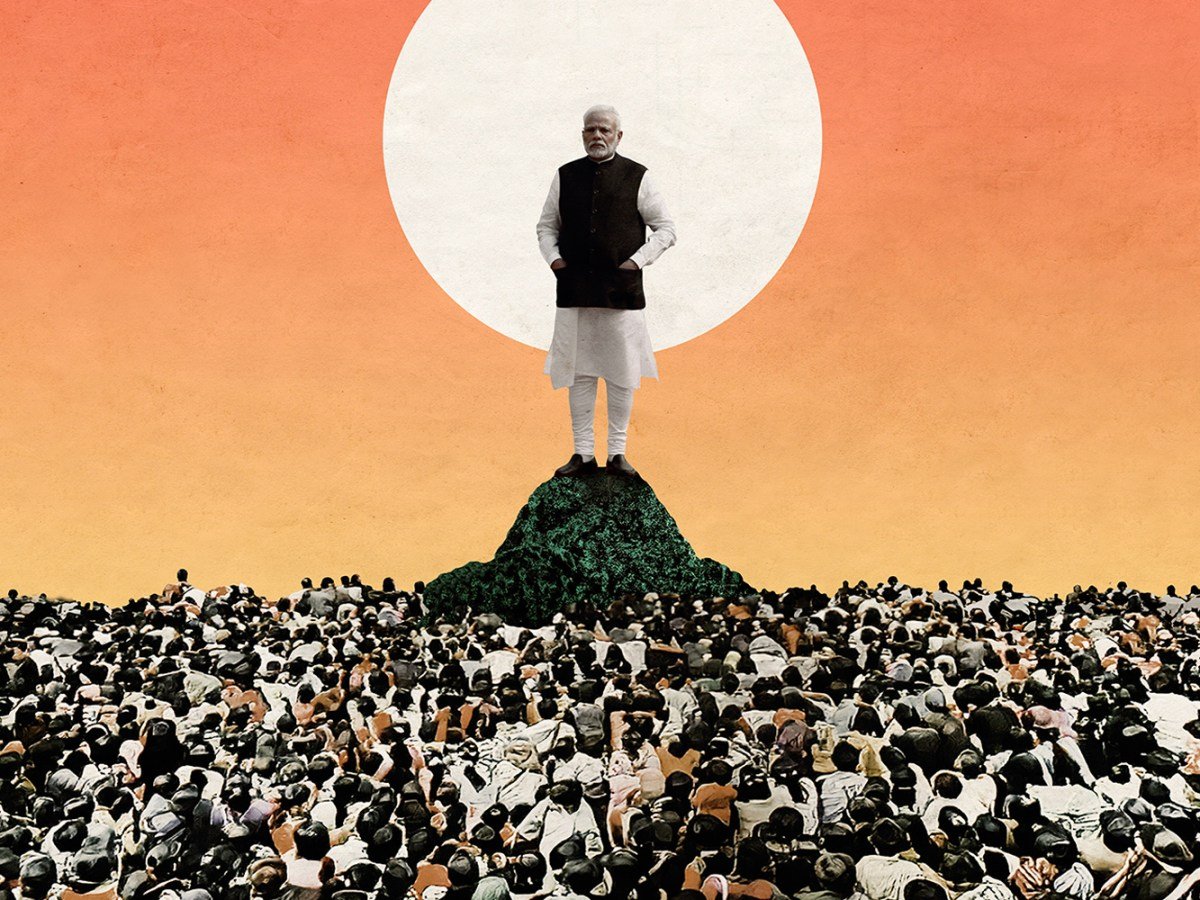
.jpg) Mathew John
Mathew John

Two thought-provoking pieces by Yogendra Yadav ("The Nationalism We Forgot," IE, May 27) and Suhas Palshikar ("Who Stole My Nationalism?" IE, May 31) made for a fascinating debate on the texture and trajectory of Indian nationalism.
Yadav argues that the rich legacy of Indian nationalism from our freedom movement, which was about "belonging without othering" and unity sans uniformity, has been overwhelmed in the last decade by a Nazi version that upholds national interest over individual freedom and identifies the government with the nation. But he also blames the liberal, secular elite for the regression in the pristine nationalist spirit, charging them with a "deracinated cosmopolitism" that ignored the cultural and spiritual undertone (?), because of which they lost touch with the common man.
Professor Palshikar is emphatic that nothing can mitigate the virtual dismantling of nationalism by the current regime through practice and ideology, which, he believes, is not backsliding "but a resolute replacement of Indian nationalism." He contends that excoriating the secular-liberal elite as abettors for the crisis in Indian nationalism, as Yadav has done, is to attach significance to a marginal force. Of much greater import were the deep fissures that were evolving in the late 19th and early 20th century between an inclusive Indian nationalism and its phoney alternative that was "rooted in othering and instrumental unity without genuine belonging."
To add my twopenny bit, notwithstanding the toxic faith-based majoritarian nationalism germinating on the side, our nationalism was not in a bad place until the 1980s. Yogendra Yadav may turn up his nose at my lived experience of an India that was pluralistic, inclusive and grounded in democratic values where we didn't need to prove our Indianness or be judged by the clothes we wore or the size of our eyes, nor did we feel the need to tamper with historical facts or denigrate our freedom fighters in order to craft an alternative Hindutva nationalist vision.
I remember an unselfconscious nationalism, respectful of religion but not obsessed with it, a milieu where our patriotic instincts were fired up by the histrionics of 'Mr Bharat' Manoj Kumar and the dulcet tones of Mohd Rafi and Lata Mangeshkar. There was no deliberate fostering of deep cultural and spiritual traditions; that "shallow modernity and deracinated cosmopolitanism" worked very well for us. If only we could get back that nationalist spirit!
In debating Indian nationalism—good and bad—these two public intellectuals have broached a subject of the greatest significance. It has turned the world upside down, particularly over the last decade.
The nationalism that we witness today is the depraved patriotism of the mob. In truth, nationalism has been commandeered to legitimise all forms of bigotry. In the crazy world that we live in, the insurrectionists who stormed the Capitol on January 6, 2020, are released and hailed as nationalists, whereas the protestors in Los Angeles fighting for justice against the authoritarian Trump regime are hounded as anti-nationals.
It is necessary to draw a distinction between nationalism and patriotism in terms of the emotive quality of loyalty to the nation. Nationalism invokes blind support for everything the country does – the 'my country right or wrong' syndrome that incites aggressive assertion and a lust for power, whereas patriotism is tolerant, humane and critical of actions that are destructive of the values that the country cherishes.
Is it any wonder, then, that the world's great minds were not enamoured of nationalism? HG Wells condemned nationalism as "a monstrous cant that has darkened all human affairs." He believed that our true nationality was mankind. Rabindranath Tagore was no devotee of the constrictive tendencies associated with attachment to the nation, which he viewed as "holding up gigantic selfishness as the one universal religion."
Dr BR Ambedkar was wary of nationalism "that is at once a feeling of fellowship for one's own kith and kin and an anti-fellowship feeling for those who are not one's own kith and kin." He warned that loyalty to the nation was endangered by competing loyalties to religion, culture, and language.
The iconic revolutionary Bhagat Singh represented a nationalism that was the very antithesis of what's being practised today. His nationalism was anchored in his atheism and signified much more than driving out the British. It meant ridding our society of the evils of casteism, untouchability and communalism. Sadly, today, he is glorified, but his revolutionary nationalism that was centred on the oppressed and the poor has been overwhelmed by one that is cruelly majoritarian and focused entirely on the needs of the privileged.
Today's nationalism bears an eerie correspondence with the German experiment of the 1930s that played on the fears and prejudice of the majority. The most obvious similarity is between the Nazi doctrine of nationhood based on an exclusive ethnic German-Aryan homogeneity and rabid antisemitism vis-a-vis our indigenous fascist mobilisation constructed on a deviant interpretation of religion and morbid hatred of the Muslim.
And just as Hitler expanded his enemy list of Jews to include communists, Catholics and liberals, the current regime has gone way beyond targeting Muslims and Christians as the archetypal "Other" to branding all dissenters as the "anti-national, tukde-tukde gang."
Operation Sindoor! PM Modi has been given credit for bestowing the name "Operation Sindoor" on the military operation following the Pahalgam incident, so clearly, his camp followers think it's a great appellation. But how blasphemous to bestow an offensive military campaign with the moniker of "sindoor," which is so sacred to the institution of the Hindu marriage, especially for the woman. It is as inappropriate a name as the one given by the USA to its largest non-nuclear explosive weighing 9800 kgs, labelled "the Mother of all Bombs!" That great humanist, the late Pope Francis, was outraged: "A mother gives life and this one give death…. What's going on?"
The fig leaf of national interest and security has been used by this Government as a pretext for the furtive secrecy surrounding the Pahalgam horror and the aftermath. The nation is still in the dark about the murderers, the intelligence failure, the number of our planes shot down and the fate of the pilots, Jaishankar's self-defeating forewarning to Pakistan, Trump's alleged intervention, our suicidal foreign policy that has all our neighbours gunning for us and a lot more. The bizarre decision to keep Operation Sindoor alive is clearly intended to avoid owning up to failure on multiple fronts.
Arthur Miller had observed that "when the guns boom, the arts die," but with Operation Sindoor, it is not the arts but the truth that has been buried. The nationalist fervour gripping the country has confused and equated loyalty to the nation with fealty to the government; though crafty ones like Shashi Tharoor have used it for their own self-serving purposes.
Nationalism is the subterfuge for officially sponsored propaganda, downright falsehoods, jingoism, moral grandstanding and for treating dissent as anti-national. PM Modi's flurry of "goli khaao" speeches following the ceasefire are testimony to this ugly manipulation of nationalism.
Look at what nationalism has spawned across the world. The likes of Zionist Benjamin Netanyahu and MAGA white racist Donald Trump - post-modern versions of the Fuhrer and Duce - flaunt the badge of nationalism to wreak death and suffering. Let's all agree that Howard Zinn was spot on when he observed: "Nationalism – that devotion to a flag, an anthem, a boundary so fierce it engenders mass murder – is one of the great evils of our time along with racism and religious hatred."